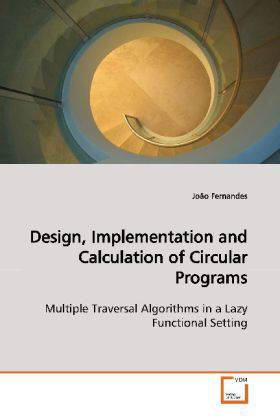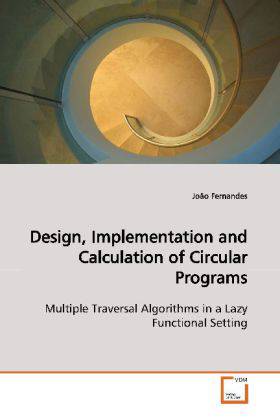
- Afhalen na 1 uur in een winkel met voorraad
- Gratis thuislevering in België vanaf € 30
- Ruim aanbod met 7 miljoen producten
- Afhalen na 1 uur in een winkel met voorraad
- Gratis thuislevering in België vanaf € 30
- Ruim aanbod met 7 miljoen producten
Zoeken
Design, Implementation and Calculation of Circular Programs
Multiple Traversal Algorithms in a Lazy Functional Setting
João Fernandes
Paperback | Engels
€ 67,45
+ 134 punten
Omschrijving
Circular programming is a powerful technique to
express multiple traversal algorithms as a single
traversal function in a lazy setting. Such a
(virtual) circular program may contain circular
definitions, that is, arguments of function calls
that are also results of that same call. Although
circular definitions always induce non-termination
under a strict evaluation mechanism, they can
sometimes be immediately evaluated using a lazy
evaluation strategy. The lazy engine is able to
compute the right evaluation order, if that order
exists. Indeed, using this style of circular
programming, the programmer does not have to concern
him/herself with the definition and the scheduling of
the different traversal functions, since only a
single (traversal) function has to be defined.
Neither does the programmer have to define
intermediate gluing data structures to convey values
computed in one traversal and needed in a following one.
In this book, we present our studies on the design,
implementation and calculation of circular programs.
express multiple traversal algorithms as a single
traversal function in a lazy setting. Such a
(virtual) circular program may contain circular
definitions, that is, arguments of function calls
that are also results of that same call. Although
circular definitions always induce non-termination
under a strict evaluation mechanism, they can
sometimes be immediately evaluated using a lazy
evaluation strategy. The lazy engine is able to
compute the right evaluation order, if that order
exists. Indeed, using this style of circular
programming, the programmer does not have to concern
him/herself with the definition and the scheduling of
the different traversal functions, since only a
single (traversal) function has to be defined.
Neither does the programmer have to define
intermediate gluing data structures to convey values
computed in one traversal and needed in a following one.
In this book, we present our studies on the design,
implementation and calculation of circular programs.
Specificaties
Betrokkenen
- Auteur(s):
- Uitgeverij:
Inhoud
- Aantal bladzijden:
- 180
- Taal:
- Engels
Eigenschappen
- Productcode (EAN):
- 9783639168969
- Uitvoering:
- Paperback
- Afmetingen:
- 220

Alleen bij Standaard Boekhandel
+ 134 punten op je klantenkaart van Standaard Boekhandel
Beoordelingen
We publiceren alleen reviews die voldoen aan de voorwaarden voor reviews. Bekijk onze voorwaarden voor reviews.








